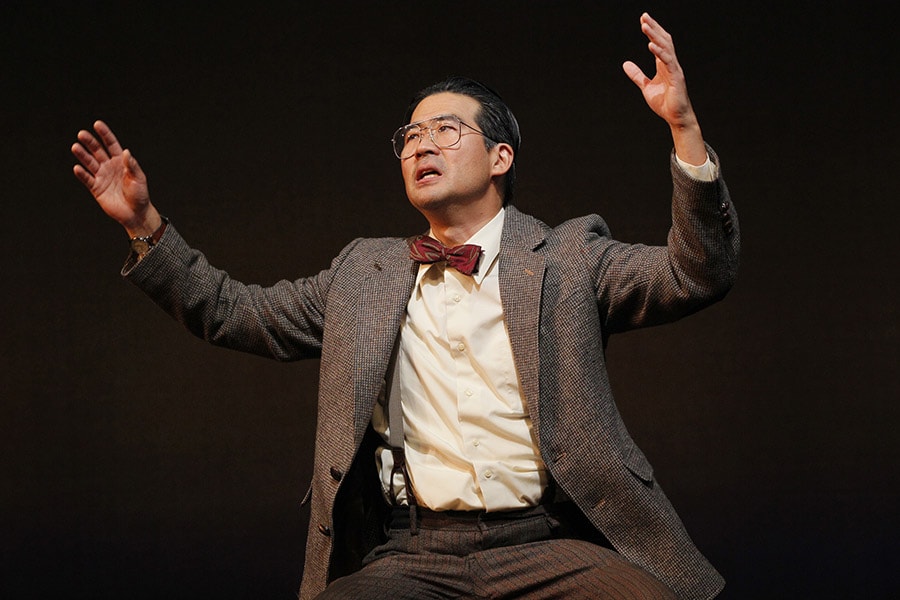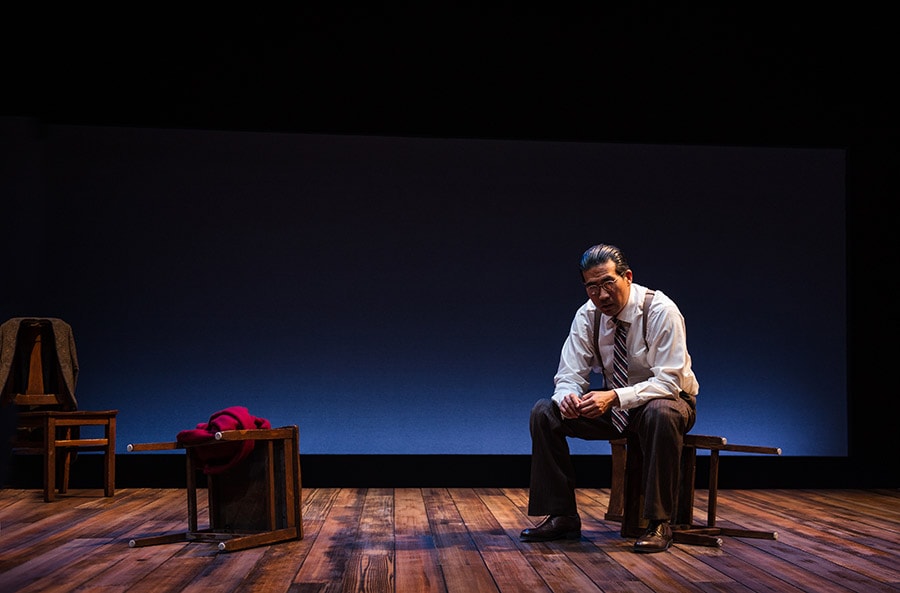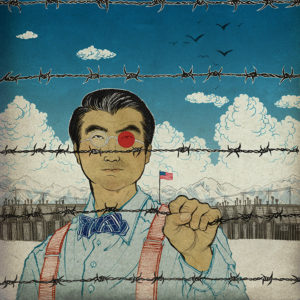There is a dramatic moment in Hold These Truths that comes as no surprise yet comes as a heart-stopping shock. We know going in that this moment is going to happen. We know that the U.S. Supreme Court is going to uphold young Gordon Hirabayashi’s conviction for refusing to comply with federal orders that during World War II sent U.S. citizens into internment camps—for the sole reason that their ancestry was Japanese. That’s what really happened then and that’s why this gripping play is in DC now. But in that foregone stage moment when Ryun Yu as Hirabayashi learns the Justices’ unanimous ruling and says, with heartrending incredulity,
I lost?
—in the silence that descends then in the Kogod Cradle, a caesura because neither he nor we can quite breathe, there comes a shock of recognition: This our nation did in our name. And this it could do again.

Since 2007 Yu has been touring with this play by Jeanne Sakata, whose research included interviews with Gordon Hirabayashi before he died in 2012 at the age of 93. Yu and Sakata bring Hirabayashi personably to life on stage: We meet him growing up among his family and the friends he makes in college; we get to know him as a very likable idealist, a Quaker and conscientious objector who seems to emanate innocence and integrity. But just as impressively, the actor and playwright bring the U.S. Constitution to life, as if it’s another character in the play.
What makes “these truths” about equality in the Constitution “self-evident”? Hirabayashi wonders early on. What indeed? And how do those truths jibe with the spate of racist slurs he encounters, then the president’s curfew and the evacuation order that he must in conscience disobey?
“Ancestry is not a crime,” Hirabayashi says, as if self-evidently.
Director Jessica Kubzansky has melded the play and the performance artfully so that what animates Hirabayashi and what animates our nation’s ideals become vividly present both onstage and in our hearts and minds. Sound Designer John Zalewski transports us from place to place along with striking documentary audio. And Set and Lighting Designer Ben Zamora offers a simple bare wood stage and plain back wall and then lifts luminous storytelling to a stunning level.

Hirabayashi has been rightly praised for his courage—and was awarded posthumously a Medal of Freedom by President Obama. As portrayed in Hold These Truths, however, he himself seems to see his bravery as simply congruent with “a responsibility to live by my principles.” Not a bad plan.
Though full of warmth, wit, and humor, Hold These Truths does not shirk from portraying Hirabayashi as a protagonist against the antagonism of state-sanctioned racism, hence vulnerable without redress to the animus of ordinary Americans.
But this is not a black-and-white story of a good guy versus bad guys. It’s also about good guys who cop out, who capitulate, who cave. Sakata’s script specifically portrays Hirabayashi in the context of cowardice among the very people who ought to have known and acted better: Liberal ACLU lawyers, for instance, ostensibly committed to the very freedoms Hirabayashi had been robbed of, turned their backs on him when he needed them—then turned around to take his case when it rose to the Supreme Court and promised them glory.
And there is a wrenching scene at his trial when we learn that Hirabayashi’s own parents, subpoenaed by the government to testify against him, do so.
The internment of American citizens of Japanese ancestry was one of the most shameful episodes in our nation’s history. And it is telling that in these troubling times several other recent plays have focused on relatedly shameful episodes: Jefferson’s Garden (about the founding fathers’ defense of slavery) Sovereignty (about federal sellouts of Native Americans), 4,380 Nights (about the hellhole that is Gitmo). It seems the season of our discontent.
The Constitution says, “We hold these truths…”—a declarative statement, however dubious in practice. The title of this play, significantly, changes the “we” to “you”: Hold These Truths is an imperative, an admonition to remember those self-evident truths and practice what they preach even when our elected officials do not.
I cannot overstate how timely and worth seeing Hold These Truths is. The production is impeccable. Ryan Yu’s performance as Gordon Hirabayashi is inspiring. But it is the play’s resonant content—about what makes America great and what doesn’t—that really gets us where we live right now.
Running Time: Approximately 90 minutes, with no intermission.
Hold These Truths plays through April 8, 2015, in the Kogod Cradle at Arena Stage at the Mead Center for American Theater – 1101 Sixth Street SW, in Washington, D.C. For tickets call (202) 488-3300 or go online.





